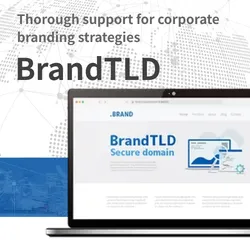GMO BRAND SECURITY is well acquainted with the “Enemies” that infringe upon brands.
RICOH Company,ltd.,Branding Section, Brand Strategy Department, Hiroko Hayashi
The domain management guidelines themselves were created by GMO BRAND SECURITY, with whom we started working around the time we acquired the new gTLD.
In recent years, there have been global advances in smartphone usage and a rapid increase in phishing sites, among other changes in the digital environment. As a result, our existing domain management guidelines have gradually become outdated in terms of operations. We’ve come to recognize the need for a review and update, especially after experiencing domain-related incidents for the first time. This realization has prompted us to take action and revise the guidelines accordingly.
For this renewal, there was a desire, not just for a management manual that simply outlines procedures, but to clearly establish overarching principles that serve as criteria for decision-making when acquiring or relinquishing domains. The aim was to make sure that practitioners are keenly aware of the “Enemies” trying to misuse the brand, allowing for a clear understanding and conscious decision-making process.
GMO BRAND SECURITY is well-versed in understanding the “Enemies” who infringe upon brands, and they provide countermeasures from multiple perspectives. They also have a “brand protection” viewpoint that not only safeguards individuals but also the “enterprise” from incidents. Therefore, we have decided to continue relying on them for the renewal of our guidelines.
The Corporate Branding Department does not directly interact with end users, but it carries the mission of protecting the company’s brand image and everyone involved internally from incidents. To fulfill this mission effectively, there are areas where we cannot compromise and others where flexibility is needed for a balanced approach. In such times, the sales representatives from GMO BRAND SECURITY have been incredibly supportive, providing multiple options that are easy to consider in response to our general challenges and encouraging collaborative thinking, which is greatly reassuring.
I feel that being able to ask questions freely and feeling like you have a close ally who deeply resonates with our mission is important not just for the guidelines but also for making significant decisions.
The consultant who actually creates the framework of the guidelines has experience working in domain management tasks in typical companies. Therefore, there’s a sense of reassurance in knowing that they understand the balance between the ideal ‘should be’ and the practical ‘what can actually be done in the field.’ It’s not about making the guidelines overly strict, as that could render them meaningless, but rather about ensuring they remain relevant.


